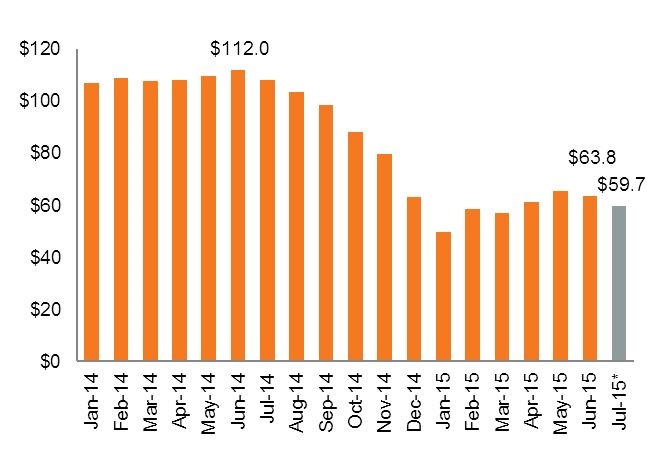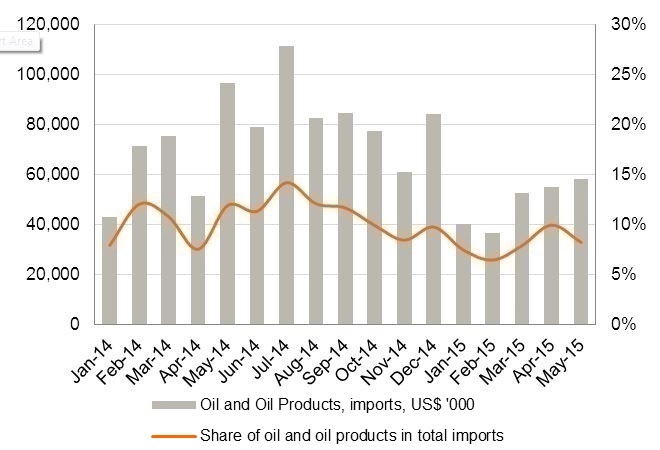Oil Prices – the Effect on Georgia
Crude oil prices have tumbled from $112 per barrel in June 2014 to $57 in the beginning of July. The drop can be attributed to a handful of key reasons. On the demand side, weaker economic growth in Asia and the ongoing weakness in Europe have facilitated the drop in oil prices. The gradual shift toward more energy-efficient vehicles has also weighed on demand for oil. On the supply side, domestic production in the United States has nearly doubled over the last six years, owing largely to new capabilities in shale oil. The spike in US domestic supply has drastically reduced the need for imported oil, which now must be diverted elsewhere. OPEC – the Organization of the Petroleum Exporting Countries – has further exacerbated the resulting glut on the world markets by refusing to decrease production. Their rationale rests on experience – the last time they propped up the oil price by reducing output in the 1980s, they lost both revenues and market share to competing producers. This time, OPEC has in fact increased its production.
Exhibit 1: Average monthly price for crude oil, US$/barrel, 2014-2015

Source: Bloomberg
*July 2015 crude oil price calculated as the average price over July 1-6, 2015
As this article goes to print, talks are underway in Vienna between Iran and six world powers – the US, UK, France, China, Russia, and Germany. Iran’s nuclear programme – the topic of discussion in Vienna – has been the cause of far-reaching western sanctions on the country. If the negotiators reach an agreement by the self-imposed deadline of July 7th through 9th, sanctions on Iranian crude oil exports will be lifted, hitting the already oversupplied market with up to 700,000 barrels per day. According to International Energy Agency analysts, oil prices might tumble down to US$15/barrel if the sanctions on Iran are lifted.
The primary effect of lower oil prices is a transfer of resources from oil-producing to oil-consuming countries. In 2015, an estimated US$ 1.6 trillion will change hands from the former to the latter in terms of savings on oil imports. For the world economy, the net effect is supposed to be positive, as wealth is transferred to consumers, who are more likely to spend it.
How well does Georgia fare in this new reality? At first glance, it benefits from lower oil prices as it imports 100% of its consumption. The country has already saved almost US$ 100mn on its oil import bill in the first five months of 2015, which amounts to 28% savings compared to the same period a year ago. These savings can be used on goods and services that can fuel economic growth. Furthermore, lower oil prices restrain inflationary pressures in the face of currency depreciation. However, a closer look reveals vulnerabilities, as Georgia has significant ties with oil-producing countries hard hit by the lower oil prices, such as Russia and Azerbaijan. Moreover, the Russian slowdown, resulting from a confluence of low oil prices and sanctions, has impacted other CIS countries. As these economies, which are major Georgian trading partners, have been battered, Georgia has experienced negative spillover effects. Two key areas of direct exposure, which have been negatively affected, are exports and remittances, while tourist arrivals have held up well. In 5M15, exports fell by 46% y/y to CIS countries. The most significant drops have been to Russia, Azerbaijan, and Armenia, where exports have roughly halved. Remittances decreased by 42.2% y/y from Russia, the largest contributor with close to 40% of total remittances.
Exhibit 2: Georgian imports of oil and oil products in US$ ‘000, 2014-2015

Source: GeoStat
In the short term, the negative effects have outweighed the savings from a lower import bill for Georgia. However, in the medium to long term, Georgia should come out a winner. Firstly, it is generally understood that agriculture benefits more from lower oil prices than does manufacturing. With agriculture making up around 30% of Georgian exports, the potential benefits are clear. And secondly, Georgia has already demonstrated its adaptability and resilience following the Russian embargo in 2006. If the lower oil prices are here to stay and the current reduced level of exports to CIS countries is the new normal, we hope that there will be sufficient stimulus for a new wave of diversification of export markets. Proper implementation of DCFTA regulations and a continued improvement of the business environment will play an essential role in these endeavors.
Tamara Kurdadze and Nino Papava (Galt and Taggart)











